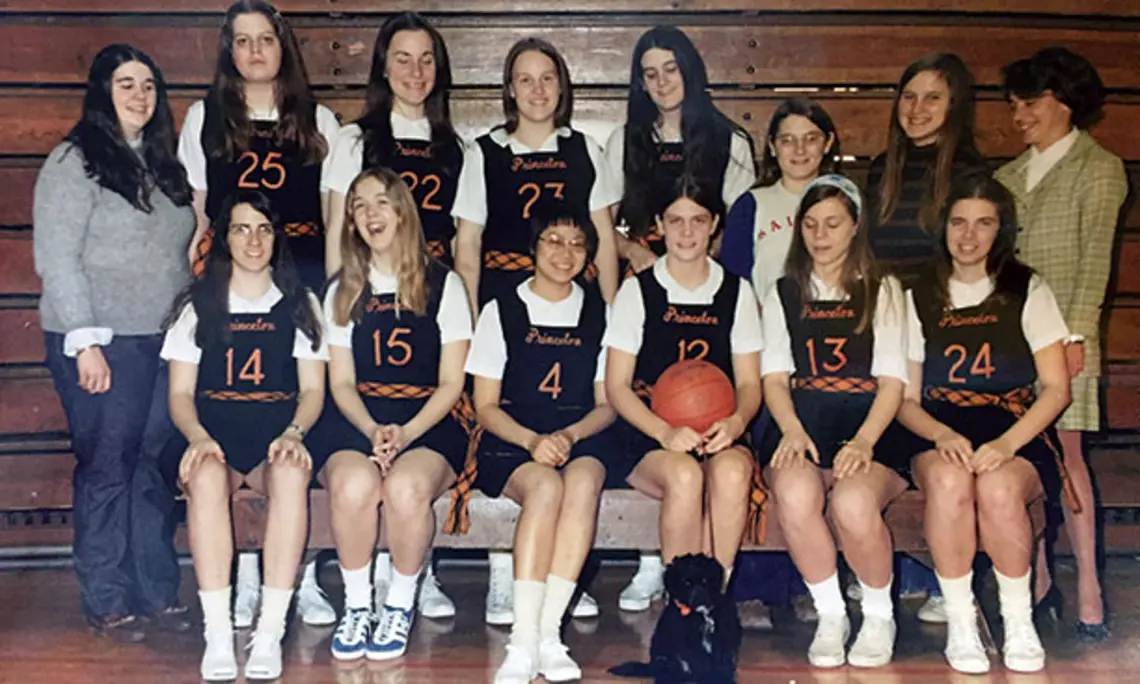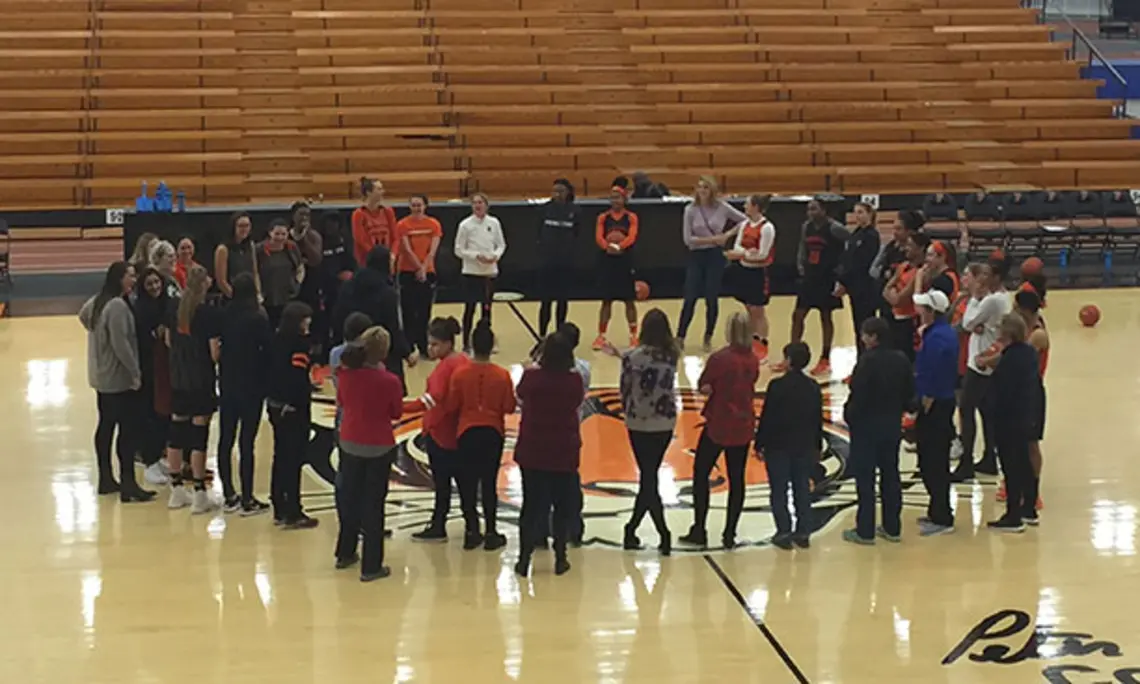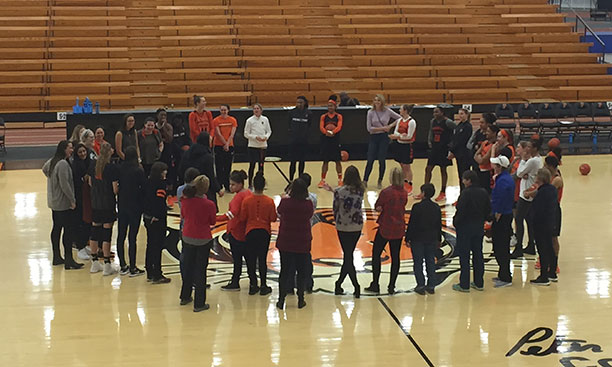

Princeton women’s basketball has become one of the nation’s top mid-major programs, with six NCAA Tournament bids in the last seven years, including the team’s first tournament win, in the first round against Wisconsin-Green Bay, in 2015. But when the program began 45 years ago, players had to work to get basic necessities like court time and quality coaching. Janet Youngholm ’75, one of the team’s founders, marvels at how far the Tigers have come. “We couldn’t see that horizon,” she said, speaking with recent alumnae in early February. “I can’t see it except through you guys in retrospect.”
Listen to reflections on the early years of Princeton women’s basketball in this episode of PAW Tracks, which features members of the Classes of ’75, ’76, ’10, and ’13.
PAW Tracks is also available on iTunes — click here to subscribe
TRANSCRIPT
Brett Tomlinson: Princeton women’s basketball has been to the NCAA Tournament six times in the last seven years, with five Ivy League championships in that span, one undefeated regular season, a national coach of the year honor for head coach Courtney Banghart, and a seemingly endless list of other awards and records.
But 45 years ago, at the beginning of this blue-chip program, the Tigers had to work to get even the basics — court time, uniforms, quality coaching. In early February, we spoke with a handful of women’s basketball alumnae, with class years ranging from 1975 to 2013, about the history of the sport at Princeton.
We begin with Janet Youngholm ’75, who helped to start the team during her freshman year.
Janet Youngholm: The only sport I’d played in high school was basketball. I was a public high school kid from Northern New Hampshire, and we played basketball. When we got — when I got here, there were only a couple of sports; field hockey in the fall, I think tennis in the spring, there was one other sport sometime in the winter.
But I had been encouraged to come here with the idea we could start a basketball. Sue Cleveland, who is Class of ’74, not here, was instrumental in helping to start a team, as was Mee Lin Mah [’75].
The University had decided in their wisdom that to start a varsity team, if they hadn’t designated it varsity right away, we were supposed to be on a five-year plan.
BT: That’s five years as a club sport, before going varsity.
JY: Do the math. It meant that we were never going to play a varsity sport that we’d already played in high school. So, we said no, no, no, that’s really not going to work.
BT: Youngholm, Cleveland, and a few others gathered a group of interested students to prove that there was support for a varsity basketball team. But it wasn’t an easy sell. Here’s Youngholm, with classmate Abby Rubenfeld.
JY: There’s an atmosphere around basketball that, you know, it’s a tough, aggressive, it doesn’t have the —
Abby Rubenfeld: It’s a contact sport.
JY: — it hasn’t been washed like lacrosse and field hockey and squash, you know, those other — it hasn’t been cleansed for women in the way that other sports have that just been accepted that oh, women play field hockey and that can be a rough sport too but basketball was just it was a different class, you know, it wasn’t a preppy sport at the time. And I think it was seen as just kind of rough and —
AR: Masculine.
JY: Masculine, yeah. It was gendered.
BT: The University did approve the team, with a limited schedule, for the 1971-72 school year. But formal recognition didn’t lead to respect at Dillon Gym.
AR: We had to get guys playing pickup games off the courts for our games, not practice, for our varsity games, we’d have to —
JY: We’d have to clean up the court and —
AR: And they didn’t want to. They were like, you’re girls.
JY: Yeah, and — and in as the picture shows, which is horrendous for somebody like me, the very first year I had a crisis because they showed the uniform. I was all ready to play, you know, varsity basketball and I’d come from a high school that had done pretty well, and they come out with these little tunicy, dressy things with sashes and embroidered numbers and little panty things underneath and, I — I mean, I barely wore a skirt let alone something like that to play sports in.
AR: Play basketball.
JY: It was humiliating. I confronted the coach. I said, “This is unacceptable.” Nobody and will wear this, you know, anyway I lost that battle. She said, “You wear this or you don’t play.”
But it was, you know — it was great, I mean in terms of just being with other young women who were doing that they loved to do for the first time at Princeton.
BT: And that first step — having a team — was crucial for attracting prospective players like Laura Drummond Megill and Pat Harnish Zajac, both Class of ’76, who met with associate athletic director Merrily Dean Baker when they were applying to Princeton.
Laura Drummond Megill: It was important to me, considering Princeton, that they did have sports programs and where they were headed with them. And so she painted me a picture of how this was all coming into being, and it was going to be great. And convinced me that, yeah, this would be a good place for a woman athlete to go.
Pat Harnish Zajac: I don’t think I really appreciated, at the time, that my freshman year was only the second year of basketball and field hockey.
LDM: We didn’t have it as well as the men, but coming from where I came from, I felt we had a lot.
PHZ: I think Laura’s right, though. When I came here, I didn’t know what we didn’t have. I wasn’t longing for what we didn’t have. I wanted to play, and we were playing, and I had good friends who played. And that was it.
LDM: And we had a good team.
BT: The team got progressively better. After a 3-4 record in its abbreviated opening season, Princeton had winning records the next two years. And in December 1974, hosting the first Ivy League basketball tournament, the Tigers swept Radcliffe, Cornell, Yale, Penn, and Brown in an exhausting round-robin event. Yes, that’s right: Five games in two days. They had their original coach, Penny Hinckley, to thank for the format. Here again are Youngholm and Rubenfeld.
JY: We were in Jadwin and all the Ivies came and everything. It was a round robin, you know, like from dawn to dusk thing. Penny had designed it and we had a new coach by then Pat —
AR: Who really had played basketball.
JY: Pat Walsh, who actually she coached the JVs at Immaculata. So this was —
AR: A big deal.
JY: — thrilling. We’re like she knew how to talk the language, she knew how to — we were talking last night, design a press, break a press, this was like whoa, so, you know, we really shot up in competitive ability, and also basketball IQ because we had a real basketball coach who’s also female, which not many coaches at the time of women’s sports were female.
Again, looking back, we didn’t we knew it was fun and great. We’re just so happy to have a tournament get every, you know, all the Ivies were now playing, you know, most of them were playing women’s basketball and, you know, so we knew it was significant but not historical if you will, you know, we were just — you know, you just did what was in front of you. We loved the fact that by my senior year we were playing — don’t laugh — 16 games instead of seven.
BT: Princeton would win four straight Ivy League championships, a feat that the Tigers would not duplicate until the recent four-year run from 2010 to 2013. Members of those teams were on hand at our roundtable talks to ask questions to the early players, including this exchange about meals and travel, featuring Megan Bowen ’13, Youngholm, and Rubenfeld.
Megan Bowen: Did you guys do like a pre-game meal, those sorts of things?
JY: No. … On weekend games, if we knew we were having a —
AR: We’d go carbo-load—
JY: We’d go to PJ’s Pancake House and eat way too much.
AR: Did Princeton pay for that or did we have to?
JY: Well, we had debated that. Some people said we paid for ourselves, some people think we got a per diem. I can’t remember.
MB: An did you ever stay at a hotel?
JY: No, oh my god.
AR: We slept on the floor of gyms and things sometimes. Yeah, at Yale that time.
JY: Yeah, if you traveled overnight, you slept in dorms or on the floors of gyms on mattresses.
BT: And Youngholm had questions for the recent alumni, too. Here she is, again with Bowen.
JY: What I wonder about did that realizing that you were being approached so what I would consider quite young — did that put pressure on you once you’re here are you identified as a basketball player and you better perform and, you know, does it affect the passion for the game, does it feel like a responsibility?
MB: I think it was different actually in regards to the fact that we didn’t — we aren’t here on scholarships so that’s different than a lot of other like athletes at other colleges’ experience. A lot of them also it forces the people who don’t want to be on the team any longer to stay on the team and that I think you had a lot of people on the team who, you know, the basketball program wasn’t paying for their college. So you were here because you wanted to be here.
BT: And all of the women had a chance to reflect on how the program has grown in 45 years. Here are Rubenfeld, Youngholm, and Cheryl Stevens ’10 with some final thoughts.
AR: I loved my time at Princeton and I loved that we started this program that has become so successful and that these other young women don’t even know, like, what we went through, I think that’s so amazing and I hope they give us our HYP pins 40 years later since we never lost an Ivy League game.
JY: Abby’s waiting. She wants the bling.
AR: I want my HYP pin.
JY: Yeah, I was going to say sort of the same thing is that it’s just I’m extraordinarily proud. I’m going to tear up, you know —
AR: You know, it’s really amazing —
JY: — you see you guys on TV or you read about it and you’re like wow, because we were just you can see but it was very moving to realize that you guys don’t even, I mean it wouldn’t occur to you to be big and strong and athletic and —
AR: That that’s good.
JY: — a female athlete at Princeton and proud of who you are and compete at the highest levels and aspire to that is — you know, and be great scholars and just all of it and when we were here and we — we couldn’t see that horizon, you know. I can’t see it except through you guys in retrospect now I look and I say wow, that’s you know what started long ago, and we couldn’t have dreamt. Sometimes I’m really envious you know, it’s like oh, because I’m too short and everything, not a fast switch fiber in my body but on the other hand I wouldn’t trade it for anything because it was just — it — it forced us to be assertive and fight for what we wanted and believed was our due but coming to this university to be fully present, engaged, have every access to everything that the guys did. And I’m glad I was able to do multiple sports here, and meet the incredible women that I met, across a spectrum, who are still part of my life.
Cheryl Stevens: From our preservative having just recently graduated it’s so neat to meet you guys and hear the stories because you’re right we don’t think about the fact that people had to pioneer this, you know —
AR: But that’s what we wanted, you know, like those don’t have to think about it.
CS: No, but it’s amazing and I mean basketball and specifically Princeton Basketball it’s shaped every part of my life and who I am so to meet you guys and hear these stories it’s just incredible and, you know, to see the girls out there playing today, you know, we feel like we helped sort of —
AR: You did.
JY: Oh, big time.
CS: You know, lay the foundation for them and it’s just this — this incredible program and something so special to be a part of so I’m excited that we have such a big group that’s back here. It’s really neat and we’ve got to keep it going.
BT: And with that, we turned off the mics and went up to Jadwin’s main floor, where more than 30 alumni joined the current team in at center court — Princeton women spanning nearly 50 years, all in one circle.
Our thanks to all the alumni who spoke with PAW, including those whose voices aren’t featured in the final cut — Cos Crawford ’78, Renee Creange ’79, Andrea Razi-Thomas ’96, and Tani Brown ’10.
Brett Tomlinson produced this episode. The music is licensed from FirstCom Music.
Paw in print

February 2026
Lives Lived & Lost in 2025, Saying ’yes’ to more housing; AI startup stars



No responses yet